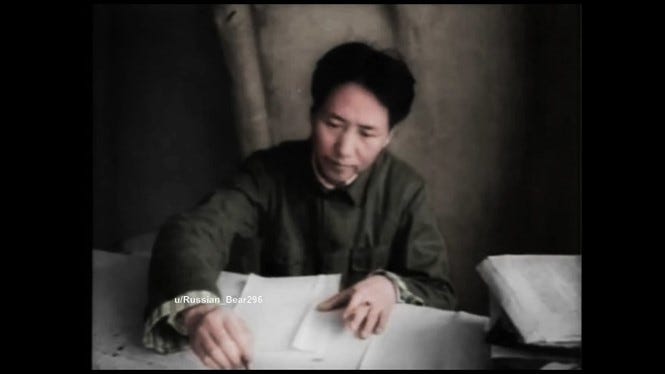Snow
[a tsu, to the melody Spring in Chin Garden, Chinyuan Chun]
[translated by Nancy Lin]
Landscape of the North –
Ice-bound a thousand miles round,
More miles on, wrapt in whirling snow!
Hushed from source to mouth,
The Grand River’s pour;
Either side of the Great Wall,
One blinding vastness.
Mountains dance like silver serpents,
Tablelands rush on – herds of wax elephants,
One topping another in contest with the skies.
It takes but a fair morn
To touch this pure white with a blush of rose –
O, enchantment past compare!
Of such varied beauty is this Land and Realm,
Heroes unnumbered have vied in paying their court.
But ah, the Chin Emperor – the Han Monarch –
No giants of culture they were;
The Grand Sires of the Tangs and Sungs,
Scarcely adept in poetry;
And Genghis Khan,
Proudest at one time as Heaven’s son,
Knew only bending the bow at the big eagle.
All are past and gone.
For manhood florid and full,
Look – the galaxy today!
Notes [by Nancy Lin]
Written in February 1936, four months after the completion of the Long March and two months after the famous Wayaopao Conference of the Political Bureau of the CPC when the policy of a national united front of resistance against Japan was formally adopted and the creation of a ‘People’s Republic’ envisaged.
“We Chinese”, declared Mao, “have the spirit to fight the enemy to the last drop of our blood, the determination to recover our lost territory by our own effort, and the ability to stand on our own feet in the family of nations.”
The poem should be read against this background.
The Grand River refers to the Yellow River and tablelands to the highlands of Shensi and Shansi, north China.
The Chin Emperor: the First Emperor of the Chin dynasty (259-210 BC);
The Han Monarch: Emperor Wu of the Han dynasty (156-87 BC);
The Grand Sires of the Tangs and Sungs: Emperor Tai-tsung of the Tang dynasty (599-649 AD) and Emperor Tai-tsu of the Sung dynasty (927-976 AD);
Genghis Khan, the Mongol Emperor who reigned 1206-1227 AD.
The lines about these outstanding rulers are meant to be criticisms rather than eulogies. This the poet made clear in the following note in 1958:
“A protest against feudalism, a critique on one of the reactionary phases of the 2000-year feudal order. Culture, poetry, the big eagle – one can only give such touches here. For after all one is writing poetry. Would you call for violent invectives? Any other interpretation wouldn’t be correct.”
The concluding two lines, he said in the same tone, “refer to the proletariat”.
In view of the various implications imputed to the above few lines, the notes by the poet himself should be of especial value.
The expression feng-liu jen-wu has several implications. I have made use of Walt Whitman’s ‘manhood florid and full’ as perhaps best suited to the context here.
[next - 19. Occupation of Nanking by the People’s Liberation Army]




Mao was not only a politician but an evil man. If politicians don't make good poets then that is even more true of evil men. In any case all politicians are more or less evil.